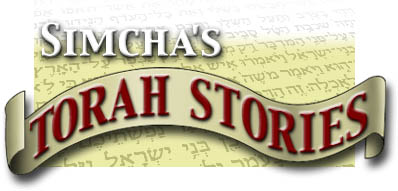Simcha's Torah Stories - Miketz

Parshat Miketz
LEADERSHIP QUALITY
"Abba, can you please help me with my homework?"
"My pleasure, Chaim. What's the subject matter?"
"This week's parsha. What name did Paroh call Yosef after he was promoted to second in command over Mitzraim?"
"Let's have a look here in the Chumash. Here it is -- chapter 41, verse 45. "And Paroh called Yosef by the name Tsafnas Paneach."
"Tsafnas Paneach. What an unusual name. Does it have a meaning?"
"Chaim, I had the same question. I looked at the commentaries of our sages on the Chumash. Rashi explains that Tsafnas means "one who explains hidden things". Yosef was able to explain the hidden meanings of dreams."
"What about the other name, Abba?"
"Rabbi Naftoli Tzvi Yehuda Berlin, the Rosh Yeshiva of Volozhin, who is known to us by the anagram of his name, the 'Netziv', wrote as commentary on the Chumash called HaEmek Davar. He writes that the word Paneach is a combination of two words: 'Pa' is from the word 'hofah' means appearance and honor. 'Nach' is from the word 'nachas', a spiritual pleasure. Yosef received great honor, and was a pleasure to all who saw him."
"Why did Paroh give him that name, Abba?"
"Paroh was amazed, Chaim. He never saw anyone like Yosef. Yosef was awesome. He was a young man, only thirty years old. The past twelve years had been spent in a prison. He was so lowly that when Paroh summoned him, they drew him out of a pit, bathed him, shaved him, and changed his clothes. Then he proceeded to interpret Paroh's dreams, and draw up a plan to save Mitzraim from starvation of famine."
"That is pretty awesome for a slave who has been in prison for twelve years."
"True, Chaim, but Paroh was even more impressed by something else. When Yosef was given all of this honor and responsibility, he handled it perfectly. Normally, a lowly slave prisoner cannot become a royal officer overnight. Yet, that is exactly what Yosef did. He handled himself as if he had been born a prince. Paroh saw that Yosef was not really a slave, but was truly a leader. Therefore, he gave him a name which reflected his true qualities."
"Abba, this is great. Thank you so much."
"My pleasure, Chaim. Do you know that we all have this quality of Yosef within us?"
"Really Abba? In what way?"
"The Torah refers to the Jewish people as a 'Kingdom of Kohanim and a Holy Nation.'"
"What does that mean Abba?"
"G-d chose us from among all the other nations, to be a light to the world. We received the Torah, our guide to life. When we live according to the Torah, we have a perfect society, which is a shining example to the world."
"What you are saying, Abba, is that we lead by example."
"Exactly, Chaim. When we are on the job, we can be an example of how to conduct our business honestly and faithfully. Our relationships with our neighbors also show our commitment to peace and cooperation."
"I can think of other examples, Abba."
"Go ahead, Chaim."
"When we give charity and help other people, we show how important it is to care for and help people. When we honor our parents and older people, we teach the world the importance of respect."
"Wonderful, Chaim. In this way, we are like Yosef. The more that we live according to the Torah, the more we lead by example. And the more we lead by example, the more our true leadership qualities shine. Paroh recognized it in Yosef, and people will recognize it in you."
"What a wonderful feeling, Abba, to know that we can have an impact on the world."
"That is our leadership quality, Chaim. We inherited it from our ancestor Yosef."
"I should get back to my homework, Abba. I have to learn the Torah well, to know how to live by its rules, and to be a good example."
"Spoken by a true leader, Chaim."
Ohr Somayach's Youth Page
General Editor: Rabbi Moshe Newman
Production Design: Michael Treblow
Dedication opportunities are available for Torah Weekly. Please contact us for details.






